It’s fair to say that I’ve embarrassed myself at least 15 times while speaking Italian and it’s mostly thanks to these seemingly harmless words. Italian is famous for its beautifully melodic words full of vowels, ma stai attento! (but, be careful!). If you accidentally confuse any of the vowels, you might end up dying of imbarazzo (embarrassment).
We all make mistakes when learning Italian. It’s the best way to learn! But here are 15 ways mispronounced Italian words can get you into real trouble, plus tips on how to avoid it!
Want to hear the pronunciation? Watch the video!
1. Say fico, not fica or figa
 Fico definition: noun; fig (or fig tree)
Fico definition: noun; fig (or fig tree)
Pronunciation: [fee-ko]
What could be more harmless than the fig? Nothing. Unless of course you accidentally change it’s masculine –o ending with a female -a. In which case, you’ve just said perhaps the most offensive word around, the c-word. Yup, whether you used the –c– or the –g– variation, you’ve just said the most vulgar and derogatory term used to describe a part of the female anatomy.
Confusingly, fico and figo can also mean trendy, hip, cool, or a cool guy.
One of my favourite Roman expressions actually uses the plural: mica pizza e fichi, literally, it’s not pizza and figs! This versatile expression can be used in a variety of situations. For example, if something is complicated or difficult, you can say “mica pizza e fichi!” or when something is beautiful/interesting/exciting, you say “mica pizza e fichi!” or when something is out of the ordinary.
How to avoid mispronouncing fico
Whenever you need to remember something, especially as important as this, you need to create a memory hook.
A memory hook is when you find a link between the word or phrase you want to learn with something you already know. This helps you recall the new word or phrase because you simply think of what you already know well.
For example, to help you remember to say fico with an -o ending, your memory hook could be to think of the shape of a fig. It’s round, like an o.
Alternatively, try learning the plural, fichi, and work backwards to its singular masculine form since –chi is a plural masculine ending. Failing that, just use the plural form and avoid using the singular form.
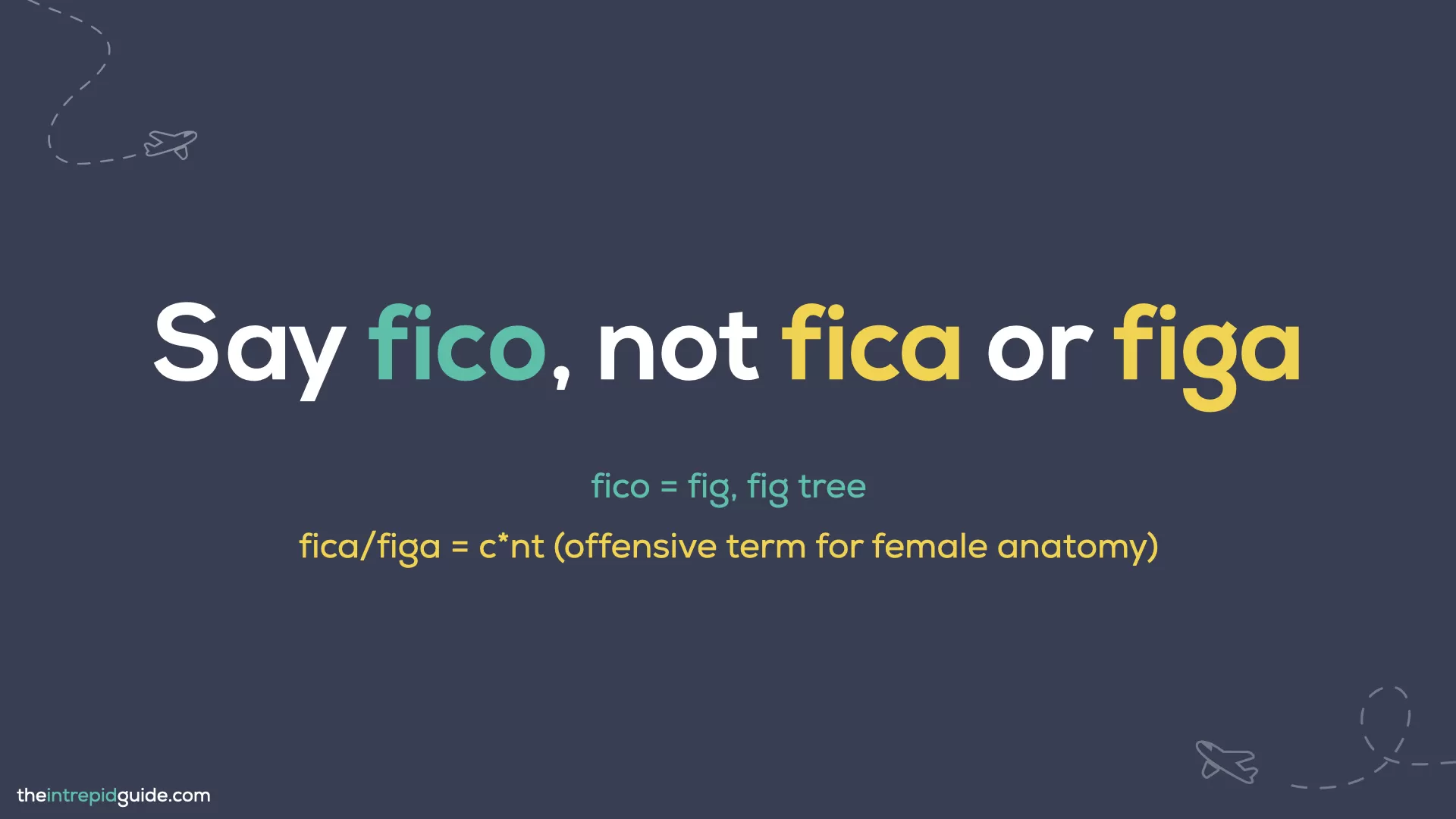
2. Say pecorino, not pecorina
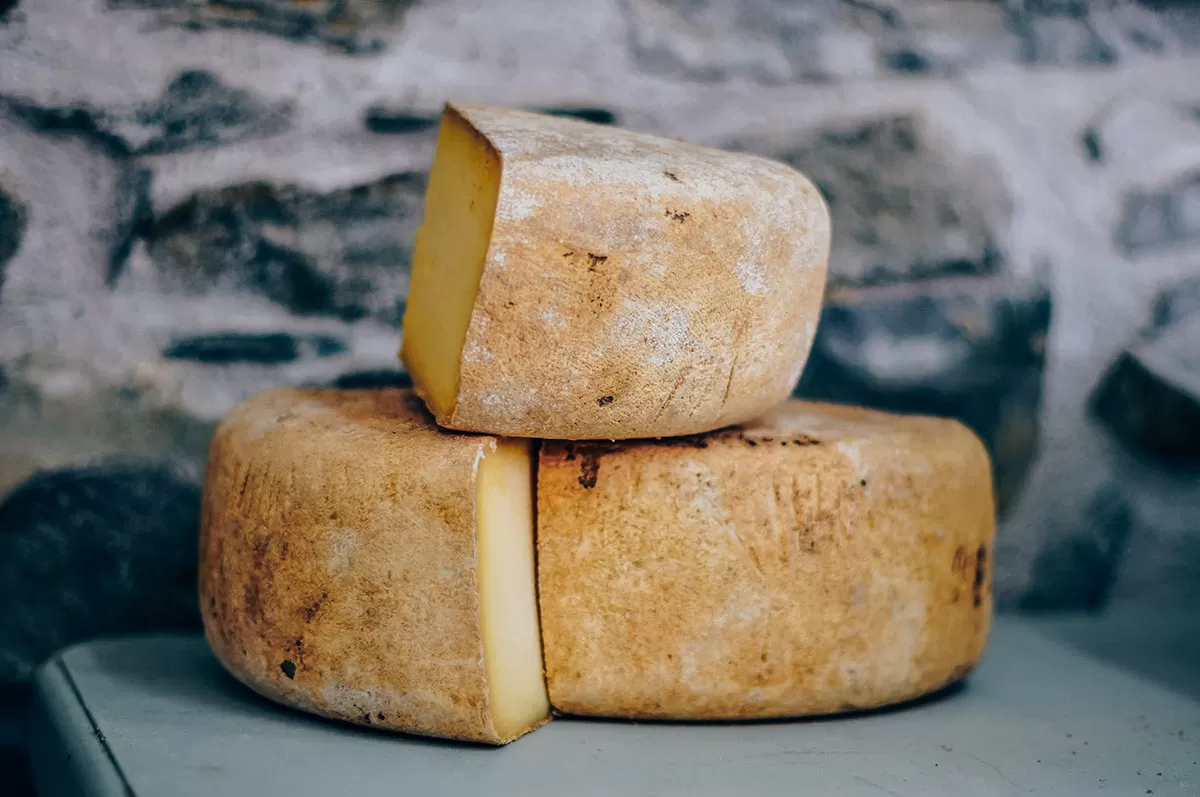 Pecorino definition: noun; sheep or Pecorino cheese
Pecorino definition: noun; sheep or Pecorino cheese
Pronunciation: [pe-ko-ree-no]
Pecorino or Pecorino romano is a popular variety of cheese made with sheep’s milk. This hard and salty cheese is often used for grating and is used in the traditional Roman dish, Cacio e pepe (cheese and pepper). The name “pecorino” simply means “ovine” or “of sheep” in Italian. Pecorino romano literally means “sheep’s [cheese] of Rome”.
Pecorino is another word you definitely want to keep in the masculine form with the final –o. If you don’t, and you ask your waiter for some grated pecorina for your pasta, you’ve just casually asked to have sex in the doggie-style position. It’s not surprising though, that the feminine ending refers to this position since it would be the female who would be in it.
How to avoid mispronouncing pecorino
A simple memory hook could be to always say Pecorino romano, not just Pecorino and focus on them both ending in –o. Alternatively, think of the word formaggio (cheese), which also ends in –o.

3. Say penne, not pene
 Penne definition: noun; penne (a cylinder-shaped pasta), or pens (singular is penna).
Penne definition: noun; penne (a cylinder-shaped pasta), or pens (singular is penna).
Pronunciation: [pen-neh]
Italian ears are attuned to hearing each letter in every word and double consonants are no exception. When you see them you need to linger a little longer on the letter. When discussing this popular type of pasta, if Italian don’t hear the double n and you say pene (pen-eh), then you really won’t hear the end of it because it actually means penis! A subtle difference in sound can lead to a massive difference in meaning.
How to avoid mispronouncing penne
To be honest, I struggled to come up with a clean memory hook without digging myself a hole. So, here is my best attempt. Since penne is traditionally cooked al dente and its shape makes it particularly adapted for sauces, such as the spicy arrabbiata sauce, think of the two sets of double consonants in arrabbiata (-rr– and –bb-) and how penne also has a double consonant.
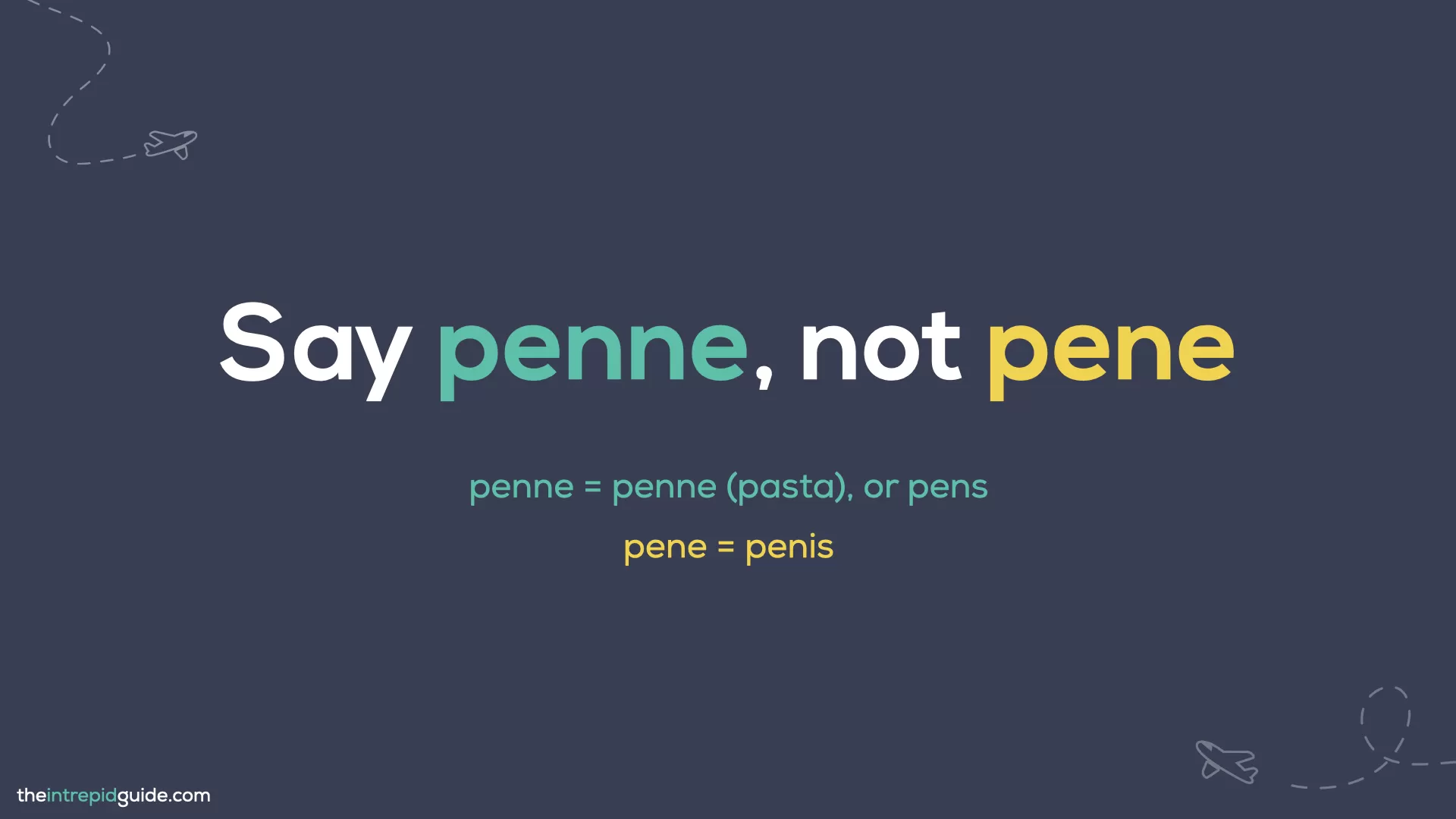
4. Say anno, not ano
Anno definition: noun; year
Pronunciation: [aan-nno]
When you start learning Italian, one of the most common questions you’ll learn how to ask is quanti anni hai? (how old are you?). But just like penne, if you don’t hit that double n consonant, you could end up asking something completely different like quanti ani hai? (how many anuses do you have?).
This everyday word is worth practicing to get right since you’ll be saying it, a lot!
How to avoid mispronouncing anno
A simple memory hook to help you remember the spelling and the correct pronunciation of anno, is to think of the similar looking and meaning word in English – annual, which also has a double n consonant.
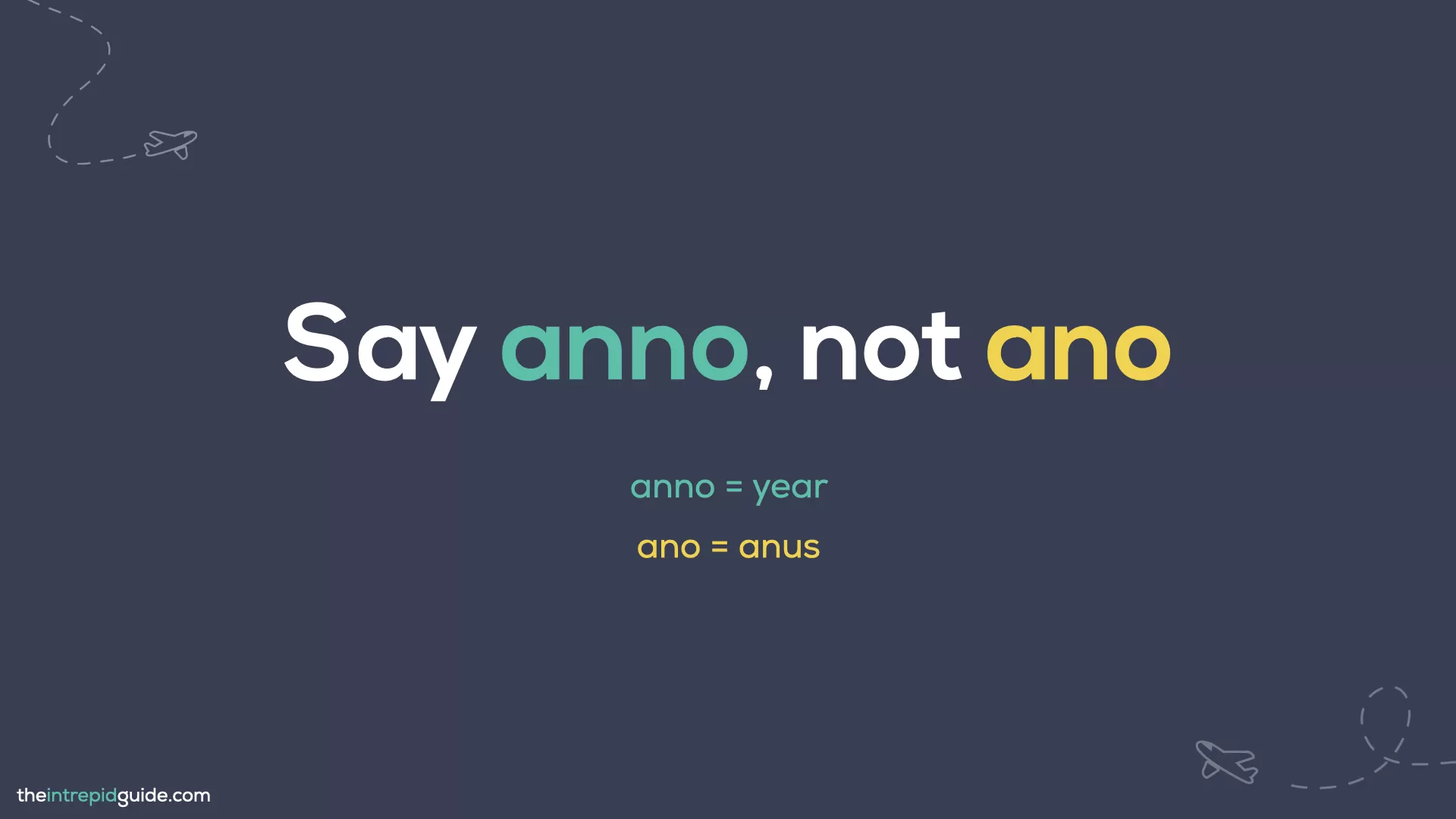
5. Say pisolino, not pisello or pisellino
Pisolino definition: noun; nap
Pronunciation: [pee-zo-lee-no]
Feeling tired after a big Italian lunch? It’s no wonder Italians like to fare un pisolino (take a nap) afterward. Just make sure you pronounce that middle o and don’t linger too long on the l or you might find yourself talking about the male appendage, again! If you say pisello or pisellino which literally means “pea” and “small pea” respectively, it’s also slang for a small penis. In English, the equivalent is something like “willy” or “pee-pee”.
An alternative and safer word for a nap is, sonnellino.
How to avoid mispronouncing pisolino
The way I used to remember how to say pisolino correctly was to think of the middle o as the shape my mouth makes when I yawn and to hold it there like I was yawning (in my mind, that is).
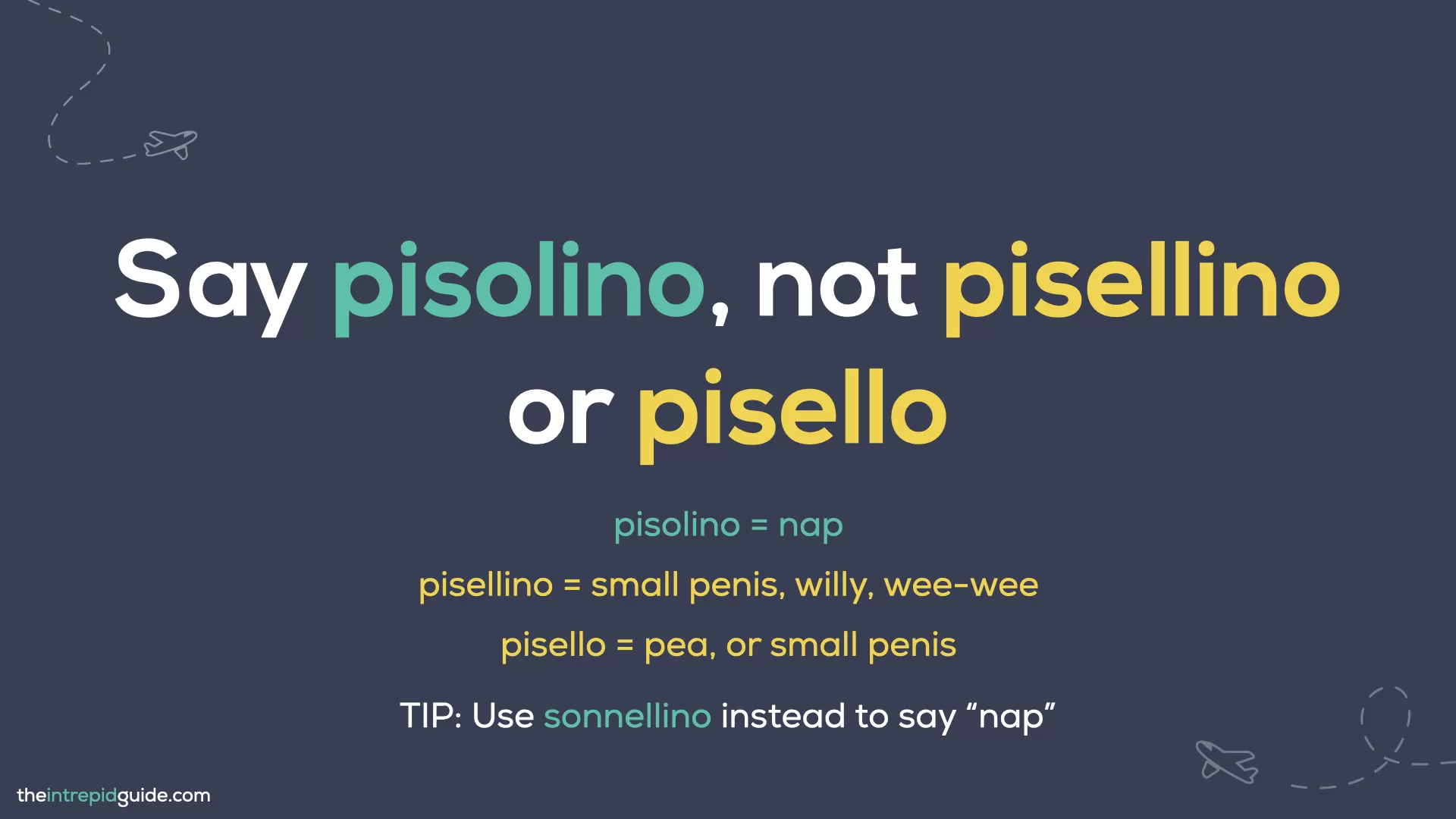
Want to learn Italian? Check out my book for absolute beginners which has received 5 stars on Amazon. Find out more about it here.
I must say that I was pleasantly surprised by the information in this book, and how useful it has been in making the next step to learning Italian. The chapter on “Italianising” English words is alone worth the 5 stars. I have been using free apps to this point, and they have been helpful, but the information in this book had moved me forward in my progress. I do recommend it, and would not have had I not thought it worth it. – Review on Amazon UK
Students loved the book so much that I even created an online travel Italian course. Learning Italian changed my life which you can read all about here and why I created this Italian language course that will transform your travels. Click here for more details and get instant access!
6. Say pippa or pipa…at your own risk
Pippa definition: noun; pipe
Pronunciation: [pip-pa]
Unlike previous words we’ve looked at, both pippa and pipa can take on two separate meanings, especially when accompanied by either two different verbs. The less vulgar of the two is with the verb essere (to be). Sei una pippa! means that you’re not good at doing something. Kind of like the English equivalent, “you’re rubbish!”, “you’re useless!”.
If you use the reflexive verb farsi (to do to oneself), then farsi una pippa means “jerking off” but farsi le pippe means “wasting one’s own time”. As you can see, you’re kind of playing with linguistic fire when you use this word.
Either way, pay attention to how you use this word and the context you hear it in.
How to avoid mispronouncing pippa and pipa
Since pronunciation isn’t an issue here, an easy way to remember these two words is to link them with their English counterpart, pipe. The spelling is almost identical and the meaning is exactly the same, except for maybe the fact that English speakers don’t associate plumbing material with self-gratification.
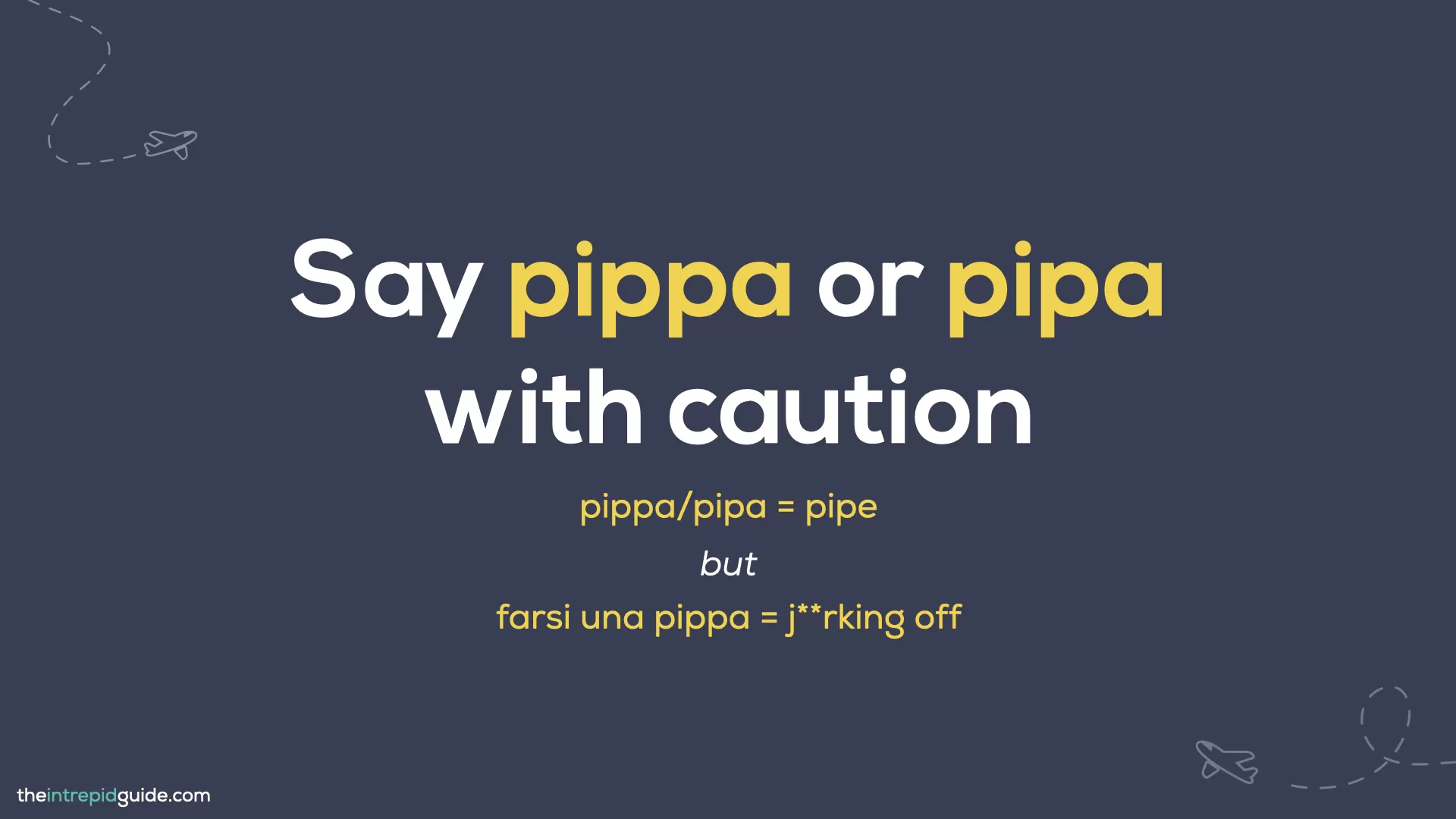
7. Say scoraggiare, not scoreggiare
Scoraggiare definition: verb; discourage, dissuade
Pronunciation: [sko-raj-ja-re]
Lending a friend some moral support? Be careful you don’t swap out that first a with an e. A well-meant Non ti scoraggiare (Don’t give up / don’t be discouraged) can easily turn into an embarrassing non ti scoreggiare (don’t fart).
How to avoid mispronouncing scoraggiare
Think of scoraggiare just like the English spelling of discourage, there is only one e, and that’s at the end. There’s no e in the middle.
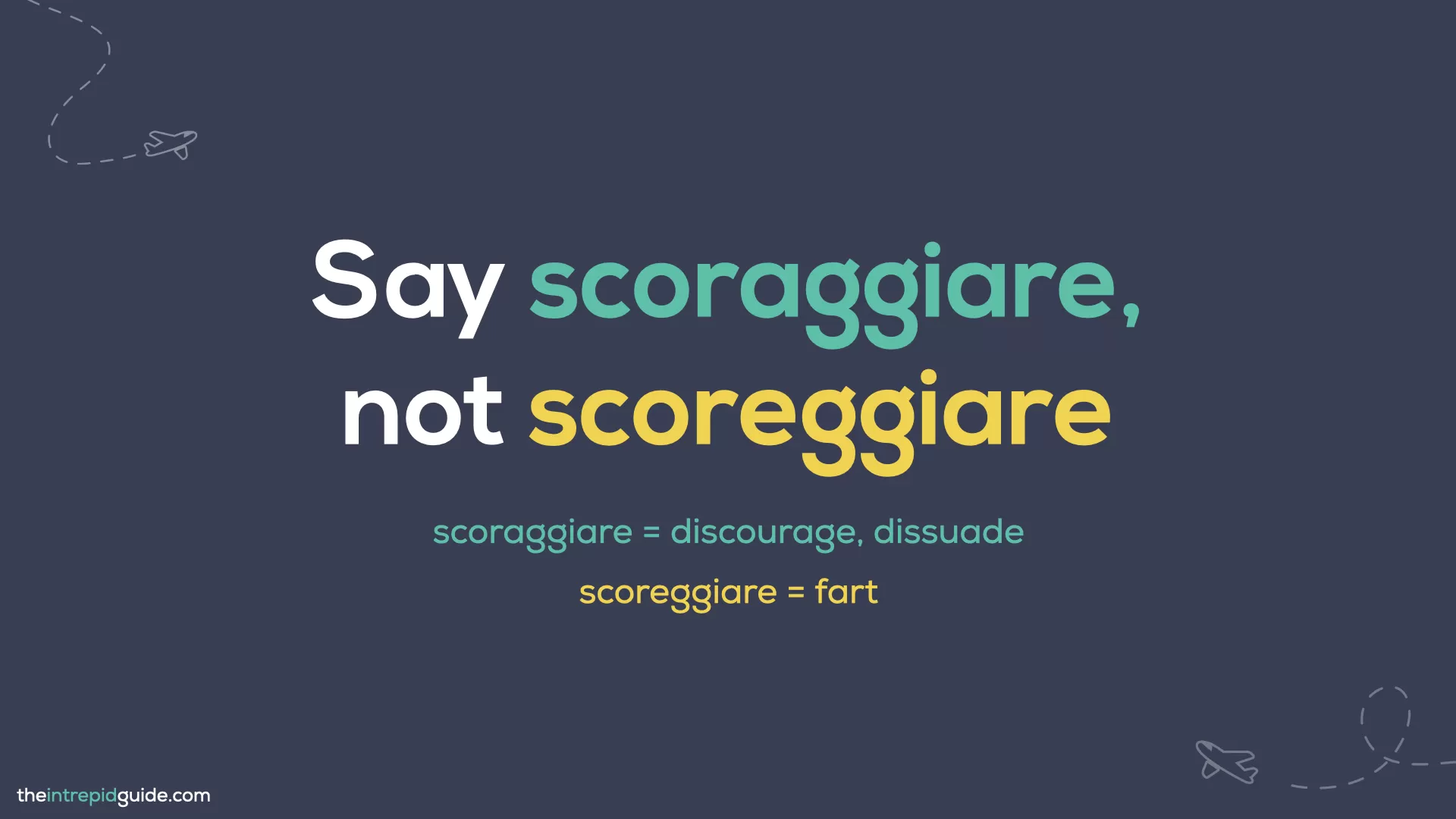
8. Say scappare, not scopare
Scappare definition: verb; escape, run away
Pronunciation: [skp-pa-re]
In a hurry? The common Italian phrase, devo scappare is often used to express, “I have to run”. Harmless, right? Not quite. If you switch the first a to an o and drop a p, then you’re quite literally saying, I have to sweep or worse, I have to f*ck,
After all the years I lived in Rome, when it came to the sweeping, I could never bring myself to use scopare for fear I’d used it horribly wrong. Instead, I used spazzare which only refers to this domestic chore.
How to avoid mispronouncing scappare
Even if you forget to sound the double consonant, it won’t be nearly as embarrassing if you don’t pronounce the first a. To help you remember, think of the English word escape. There are no o‘s in escape and no o‘s in scappare either.

9. Say papà, not Papa
Papà definition: noun; dad, father
Pronunciation: [pa-pa]
The difference in pronunciation between papa and papà is subtle but important. Though the spelling is almost identical, the accented à indicates where the stress falls. It’s a short a sound, not a long aaaa. I learned this one the hard way when a friend laughed at me when I said, Ho appena parlato con mio papa (I just spoke to my Pope).
How to avoid mispronouncing papà
When I was learning this word, what helped was associtating the quick pronunciation of papà with the short a in ‘dad’. And to drive it home a little more, I would think of the what you say in a church service, a long a in ‘Amen’.
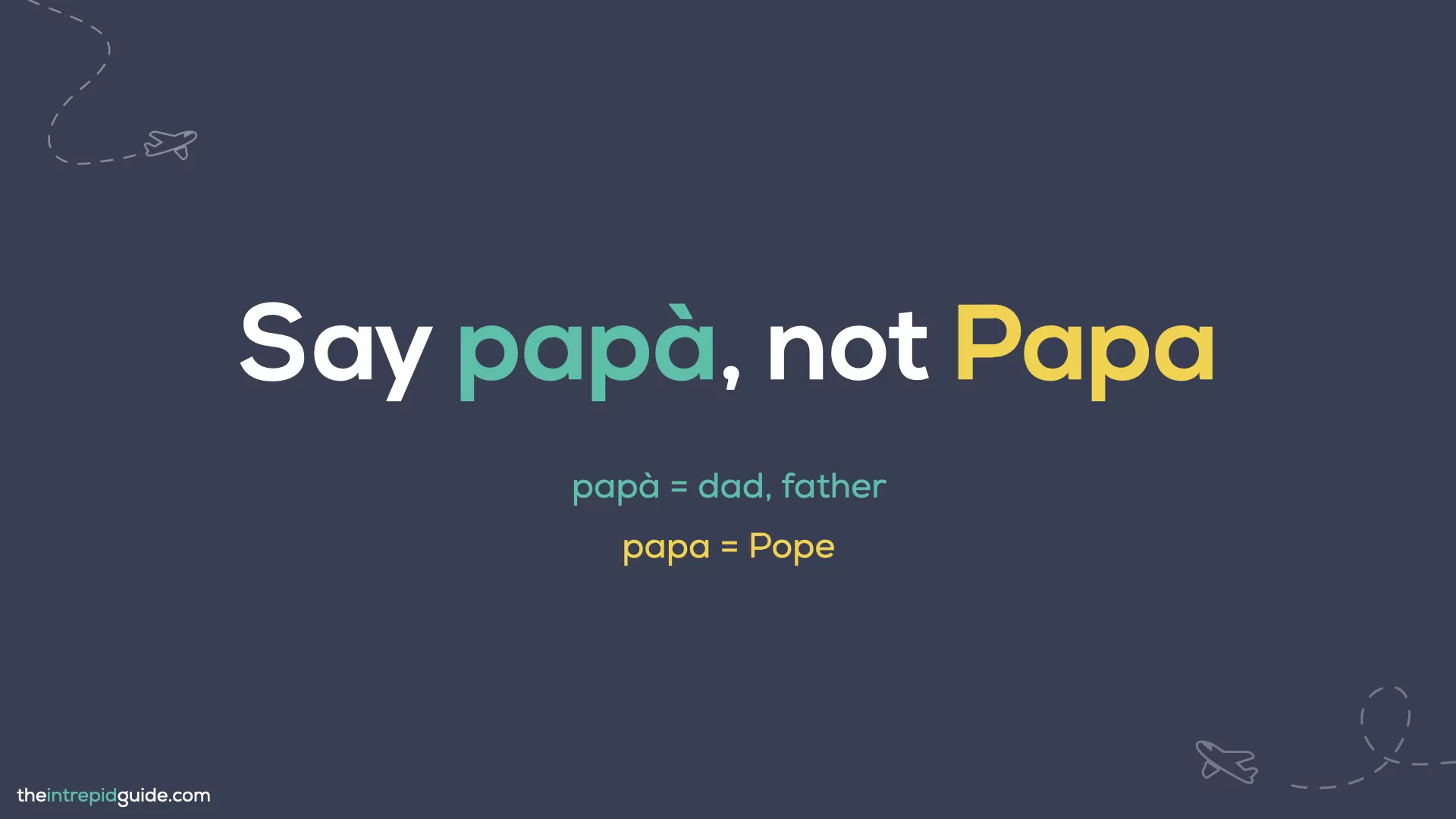
10. Say carne, not cane
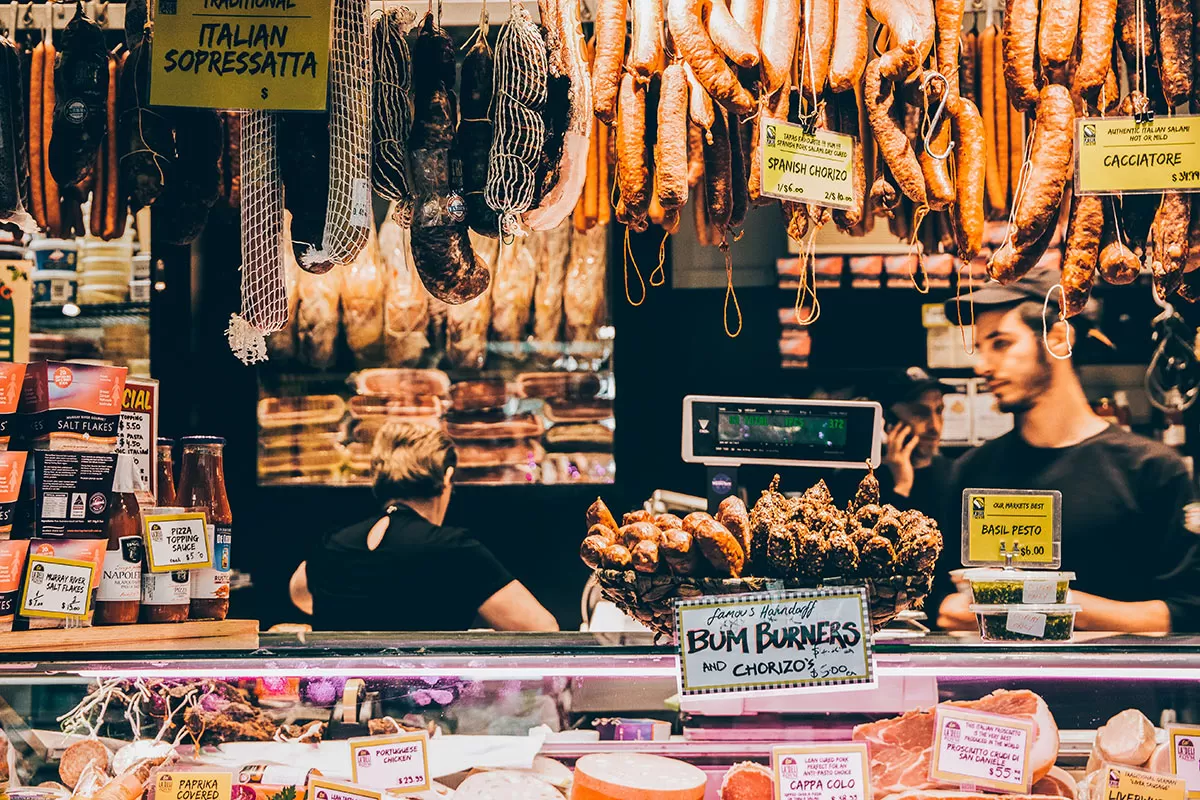 Carne definition: noun; meat
Carne definition: noun; meat
Pronunciation: [karr-ne]
As an Australian, my r’s turn into long aaaaa’s. But when I started learning Italian, I had to force my lazy tongue to not only pronounce my ‘r’, but also to roll them! Before I got into this new habit, in my head I was saying non mangio carne (I don’t eat meat) but instead I was saying, non mangio cane (I don’t eat dog). To which, my Italian friends would joke, speriamo di no! (we hope not!).
How to avoid mispronouncing carne
To help you to remember that carne (meat), has an r in it, think of the word carnivale or carnival. It also has an r and carnival is a time where participants indulge things like eating meat before giving it up during Lent.
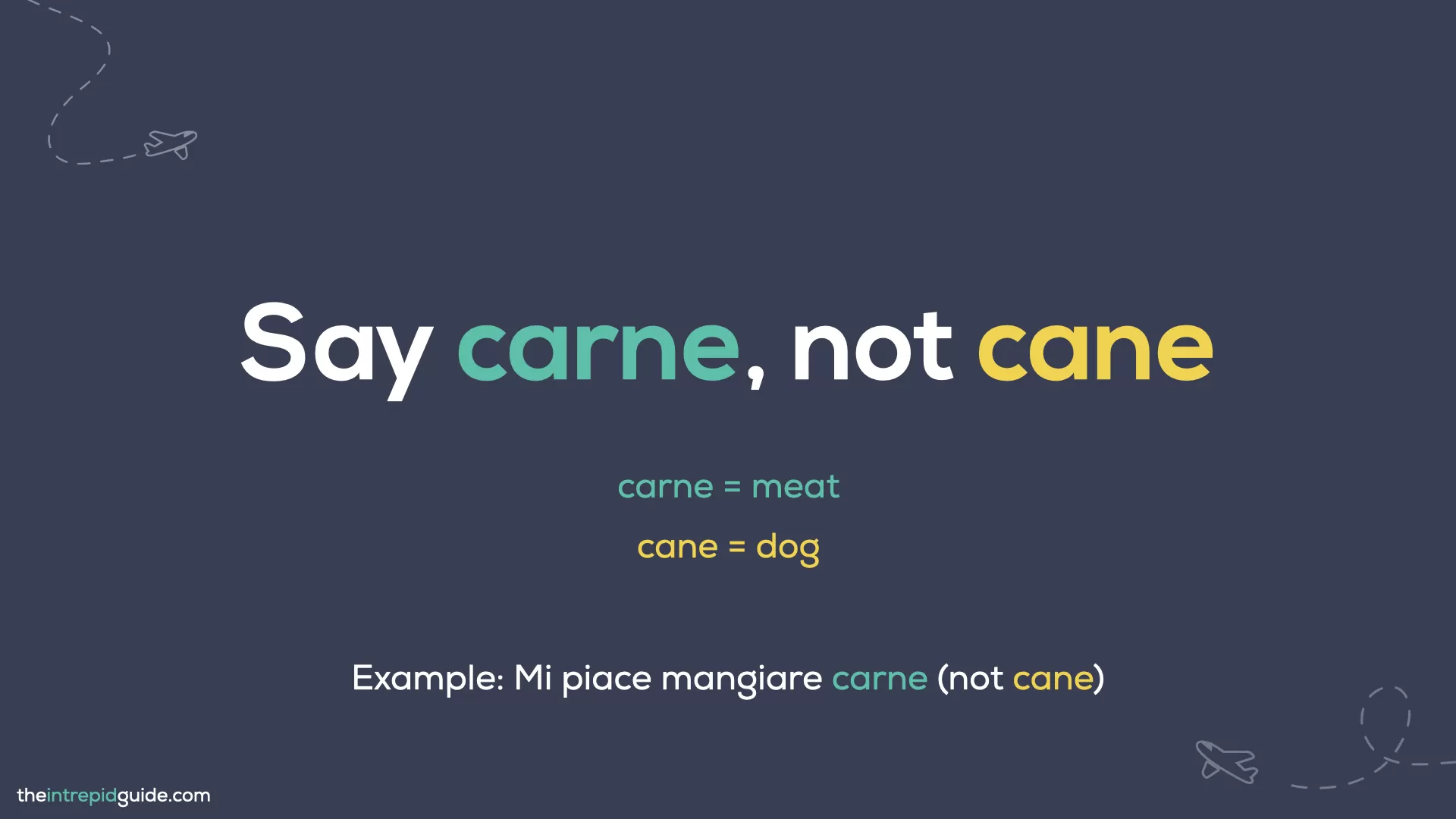
11. Say calzone not cazzone
 Calzone definition: noun; Calzone (over-baked folded pizza) or trouser leg, pant leg
Calzone definition: noun; Calzone (over-baked folded pizza) or trouser leg, pant leg
Pronunciation: [kal-zo-ne]
No matter how famous something is, it can still be mispronounced. Just like the debate with Porsch, is it porsh and por-shuh, and is Nike nyke or ni-key? (In both cases, the latter is correct, apparently). This oven-baked folded pizza that originated in Naples in the 18th century is also often mispronounced. Dropping the l sounds more like cazzone, which literally means big pr*ck or big c*ck. While we’re here, if you drop the -ne ending, you get the f-word AND a 4-letter word for the male appendage starting with d.
How to avoid mispronouncing calzone
Remembering that there is an l in calzone is key to avoid making a mortifying mispronunciation. Think of the l for leg in trouser leg or l in calzini (socks), or calza (hosiery).
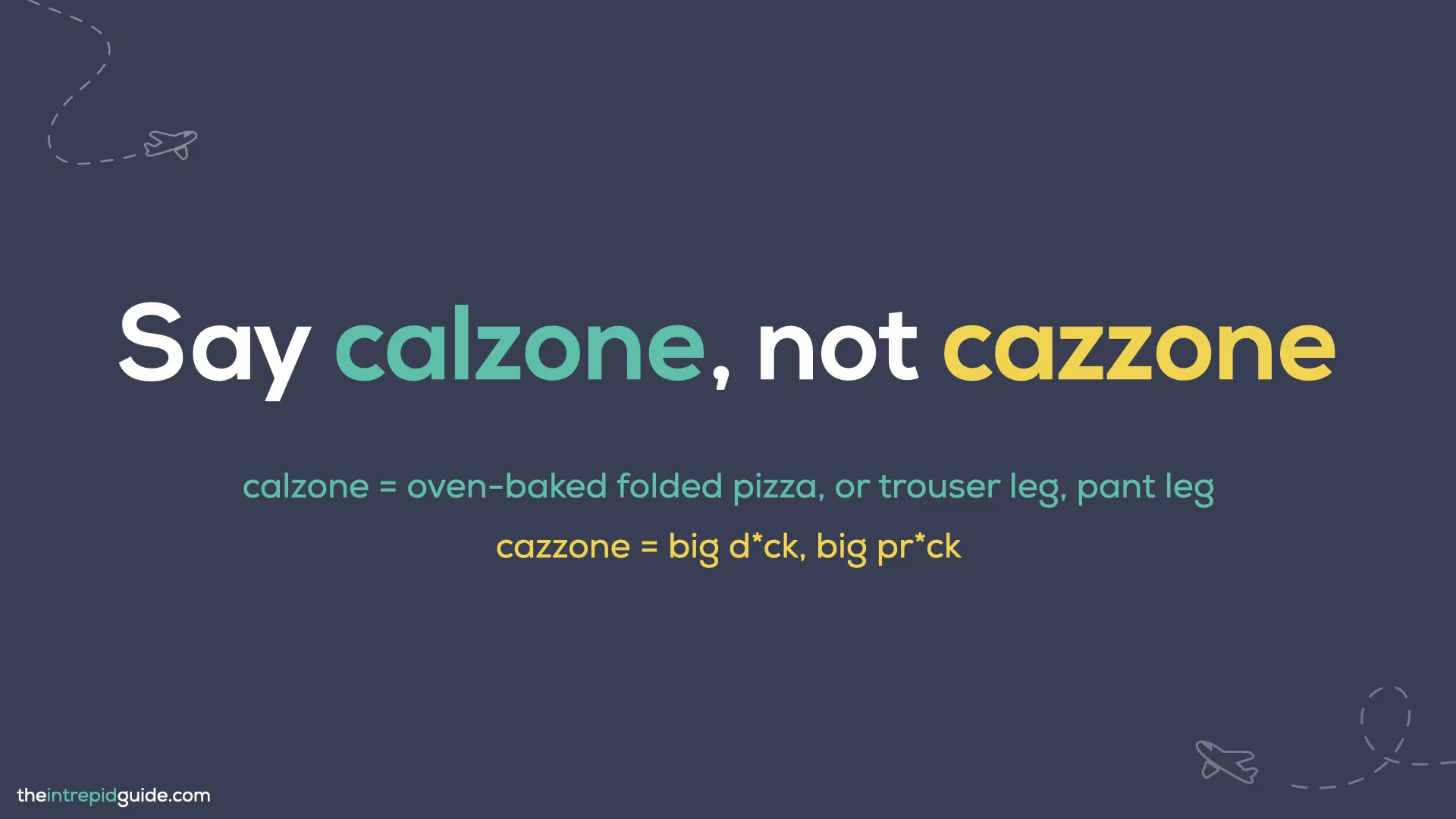
12. Say pompiere, not pompino
Pompiere definition: noun; firefighter
Pronunciation: [pom-pe-yea-re]
This one might look like it would be difficult to confuse, but when you’re new to a language and its sounds, sometimes you can only part-remember a word and pompiere is the perfect example of this. While pompiere is a firefighter, a pompino is oral sex performed on a man.
How to avoid mispronouncing pompiere
To help you remember the difference between pompiere and pompino, focus on the ending -piere then associate it with the French name Pier(r)e. So, your memory hook becomes Pier(r)e the French firefighter.
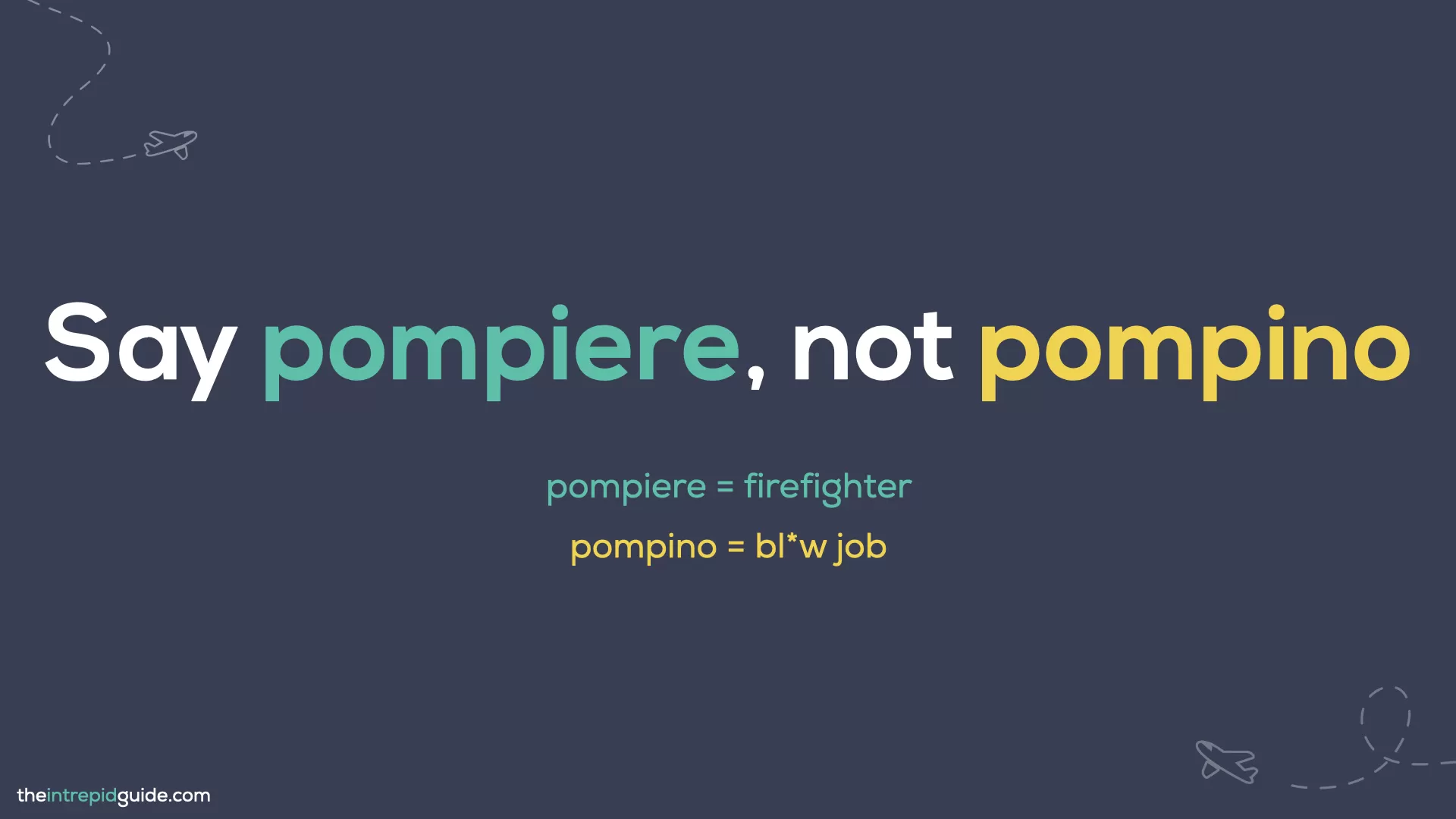
13. Say tetti, not tette
 Tetti definition: noun, pural; roofs, rooftops
Tetti definition: noun, pural; roofs, rooftops
Pronunciation: [tet-tee]
You may not think that the topic of roofs will come up often in conversation, but in cites like Rome you’re likely to visit some pretty epic panoramic viewpoints. If you feel compelled to comment on the beautiful view, either stick to using tetto in its singular form or make sure you remember that roofs in Italian is masculine and ends in an i, and not an e.
A simple phrase like guarda tutti questi bellissimi tette! (look at all these beautiful rooftops!) and easily turn into an embarrassing guarda tutti questi bellissimi tette! (look at all these beautiful tits!). Unless of course, that’s what you wanted to say.
How to avoid mispronouncing tetti
One way to help you remember that roof/s is masculine with a -o/-i, is to think of the men who constructed these buildings and that breasts are something only females have, usually.

14. Say patatine not patatina

Patatine definition: noun, French fries, potato chips, crisps
Pronunciation: [pa-ta-tee-ne]
When ordering patatine, trust me when I say that you should keep it in the plural. While patatina (with a final a) is, in fact, a single French fry/potato chip/crisp, it’s also a slang word for the female genitalia. You know, the one word that starts with p and ends in y.
How to avoid mispronouncing patatine
To help you to remember to use the e ending, always say fritte after patatine since they both need to agree in gender and number.
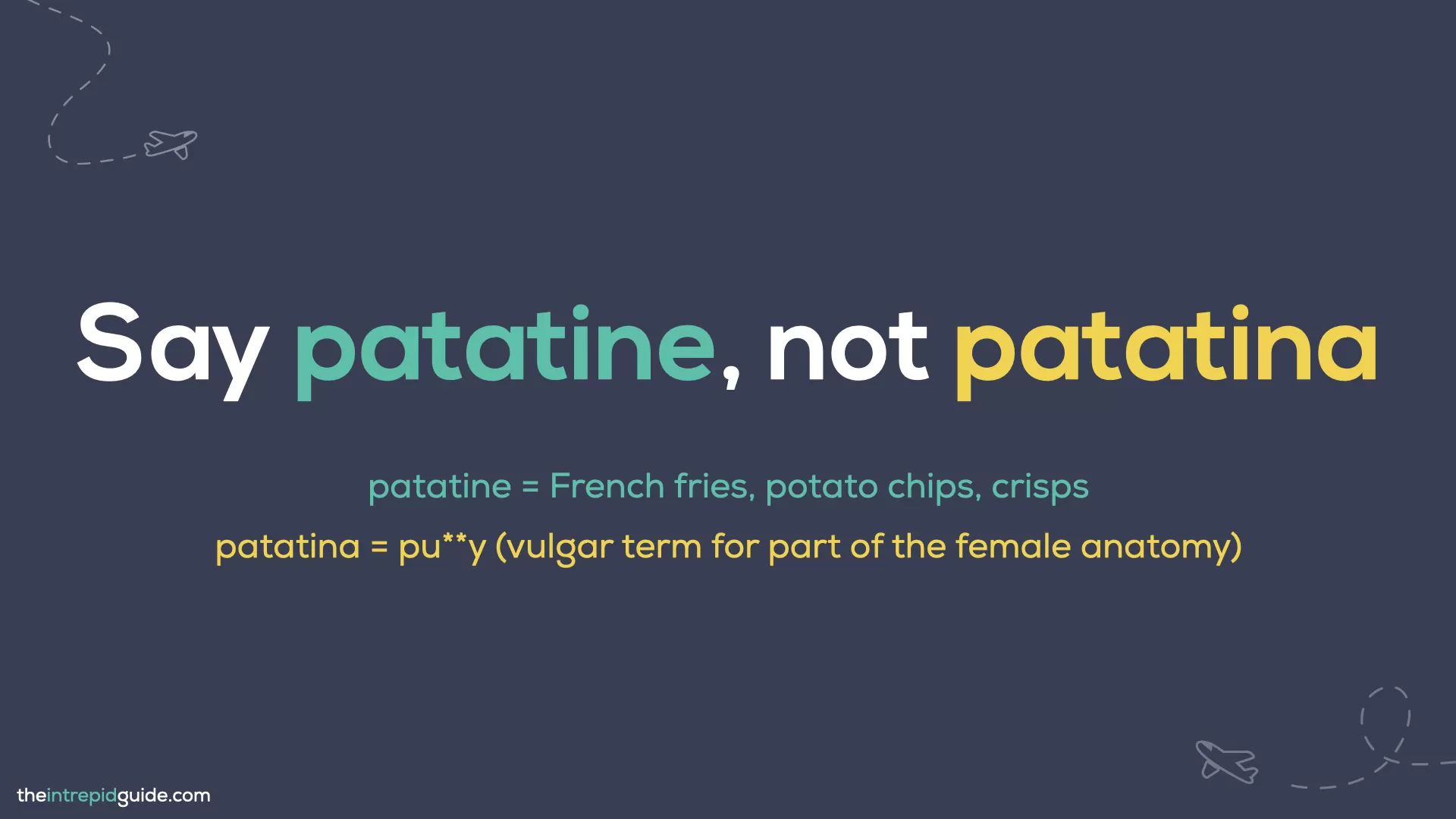
15. Say palla, not palle
Palla definition: noun, ball, sphere
Pronunciation: [pal-lah]
Just like in English, palla has two meanings in Italian; ball, and slang for testicle. It’s also used a lot in the popular Italian expressions like rompere le palle, (literally, to break someone’s balls), meaning to get on someone’s nerves. A less offensive version is rompere le scatole (literally, to break boxes).
How to avoid mispronouncing palla
Unless you say something leading like mi piacciono palle (I like balls), the chances of you making a faux pax are pretty low. Nevertheless, to help you remember that ball in Italian is feminine.
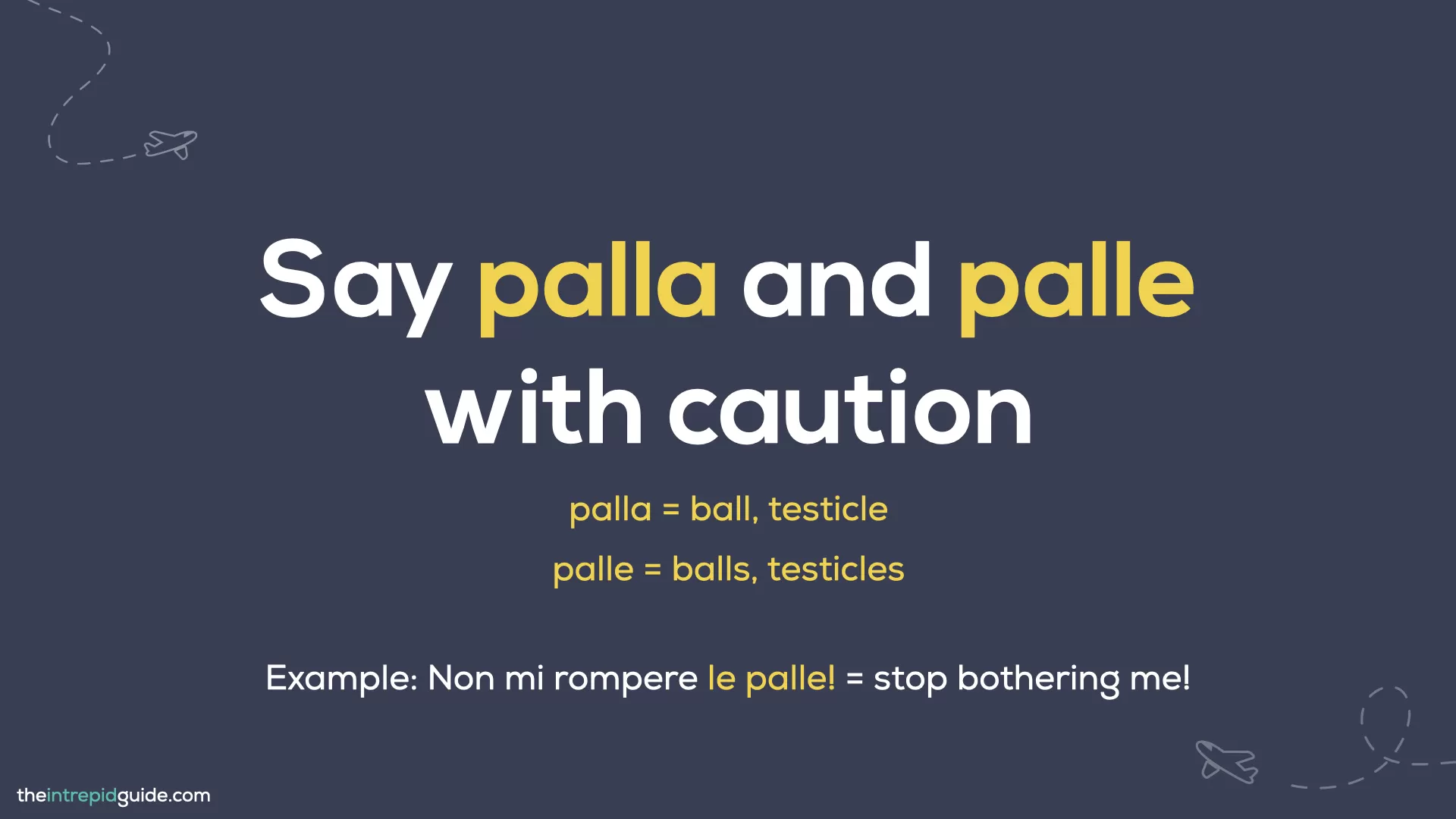
Don’t miss these Italian words with dirty double meanings!
Have you mixed up any of these words before? Can you think of any others you would add to this list?
Learn Italian with me, The Intrepid Guide!
Travelling to Italy? Don’t be treated like a tourist! Live your best travel experiences and learn Italian for less than the cost of eating at a tourist trap restaurant or a taxi driver who has “taken you for a ride”. In addition to my free Italian travel phrase guides, I’ve made it even easier for you to master the Italian language so you can create lifelong memories as you mingle with locals, get local tips, avoid tourist traps, and make new friends. Who knows you, you maybe even be invited over for afternoon tea by a lovely Sicilian family, like I was! Read all about how speaking Italian changed my life and check out The Intrepid Guide Languages courses here.
Here’s what my students are saying:

I really enjoyed the Master Italian for Travel FAST course, it certainly exceeded my expectations. The learning methodology is great, and easy to follow and found that I progressed much faster in the last 4 weeks than I ever did on my own or using other language apps. Grazie mille Michele, I can’t wait until I can put my new skills into action! – Roma Small
Click here for instant access!
Going to Italy? Download my free Italian Travel Phrase guide here.
Learning Italian? Check out these Italian language guides
- How to Conjugate Italian Verbs in 3 Simple Steps [Italian for Beginners]
- 125 Most Common Italian Phrases for Travel You’ll Ever Need [PLUS Printable]
- Master Days of the Week in Italian (7 Simple Memory Hacks)
- Italian Numbers: How to Count in Italian From 0 to 1 Billion (Plus PDF Download)
- 41 Italian Greetings: How to Say ‘Hello’ in Italian Like a Local
- How to Order Food & Drinks in Italian [Italian for Beginners]
- Is Italian Hard to Learn? 7 Common Mistakes & How to Avoid Them
- 11 Effective Hacks That’ll Help You Learn Italian So Much Faster
- Top 14 Italian Words You Should NEVER Say [& What to Use Instead]
- 20 Hilarious Everyday Italian Expressions You Should Use
- Romanesco: 25 Cool Roman Dialect Words You Should Use in Rome
- 10 Reasons Why Learning Italian Will Change Your Life
- How to Learn Italian Before Your Trip
- 10 Italian Expressions Italians Love Saying
- 10 Italian Phrases That Will Instantly Make You Sound more Italian
- Funny Italian Sayings: 26 Food-Related Insults You Won’t Forget
- 15 Romantic Italian Films That’ll Make You Love Italy Even More
- How to Master Common Italian Phrases for Travel (Like a Local!)
Like it? Pin it for later
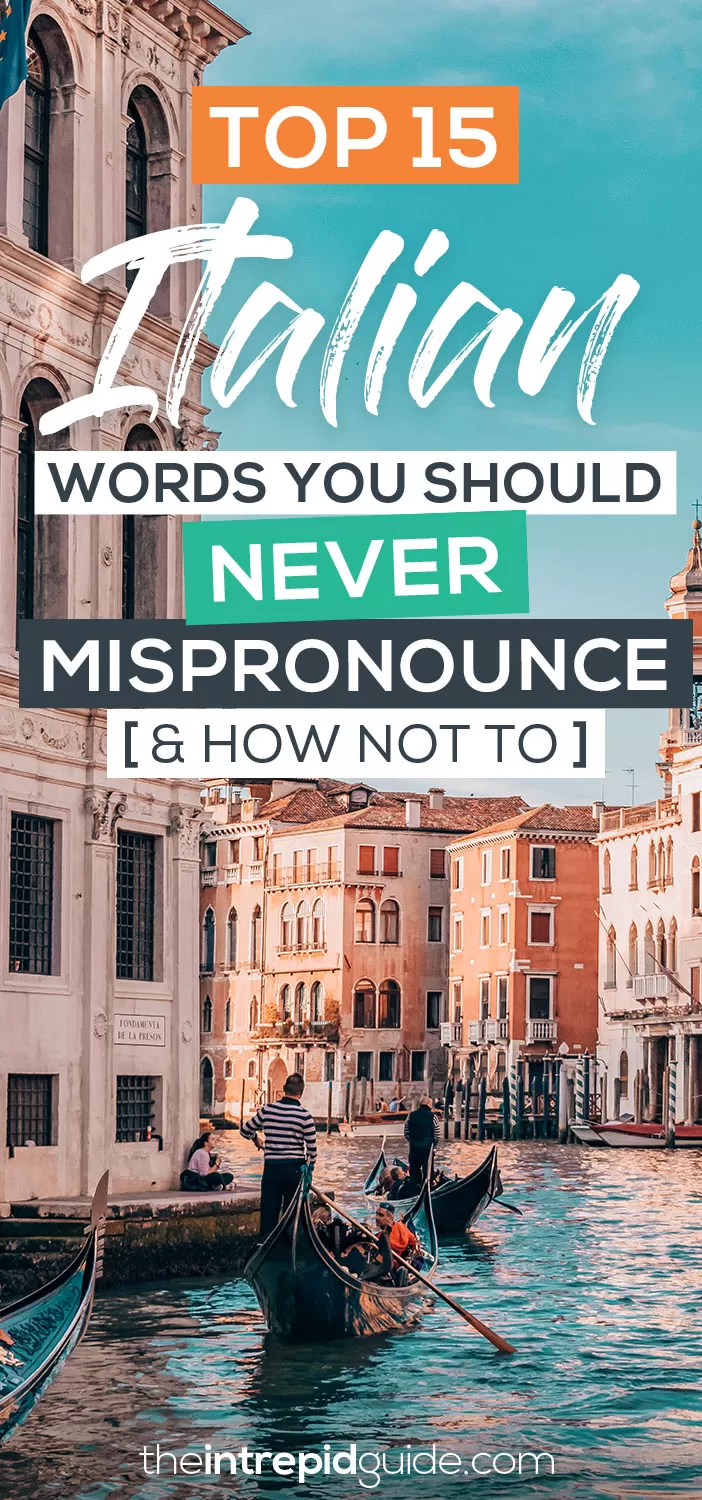
Want to know more about learning languages? Start here!
- 6 Language Learning Tips: How to Learn a Language from Home
- What Type of Language Learner Are You? Your 4-Step Personalised Learning Plan
- 15 Top Language Learning Resources You Should Use
- 44 Best Movies on Disney Plus for Learning Languages
- 13 Ways to Seamlessly Integrate Language Learning into Your Daily Life
- 10 Pro Tips: How to Learn a Language with a Full-Time Job
- 7 Reasons Why You Should Go on a Language Holiday
- Essential Travel Phrases: How to be Travel Fluent in 10 Simple Steps
- 23 Cool Gift for Language Learners They Will Actually Use and Love
- How to Learn Your First Foreign Language in 8 Simple Steps: A Beginner’s Guide
- 11 Life-Changing Reasons Why You Should Learn a Language
- 42 beautiful Inspirational Quotes for Language Learners
- Language learning tips: 11 Polyglots Reveal The Secrets of Their Success
- Top 10 Best Ways to Learn a Language Better and Faster
- How Many Languages are there in the World?
Don’t miss my Italy Travel Guides
- Top 10 Absolute Best Views of Rome That Will Blow Your Mind
- Top 10 Things to Do in Rome That Aren’t On Your List
- Visit Rome’s Secret Hidden Palace
- Rome Tips and Tricks: 27 Things You Should Know Before You Go to Rome
- Self-Guided Trastevere Walking Tour: Where to See Rome’s Most Beautiful Streets
- 26 Absolute Best Things to do in Verona, Italy
- Lakes, Mountains & Castles: 21 Best Things to do in Trento, Italy
Over to you!
Have you mixed up any of these words before? Can you think of any others you would add to this list? Let me know using the comments section below or join me on social media to start a conversation.
Thanks for reading and I hope you enjoyed this post.
Like what you see? Subscribe using the form below to have all of my posts delivered directly to your email.

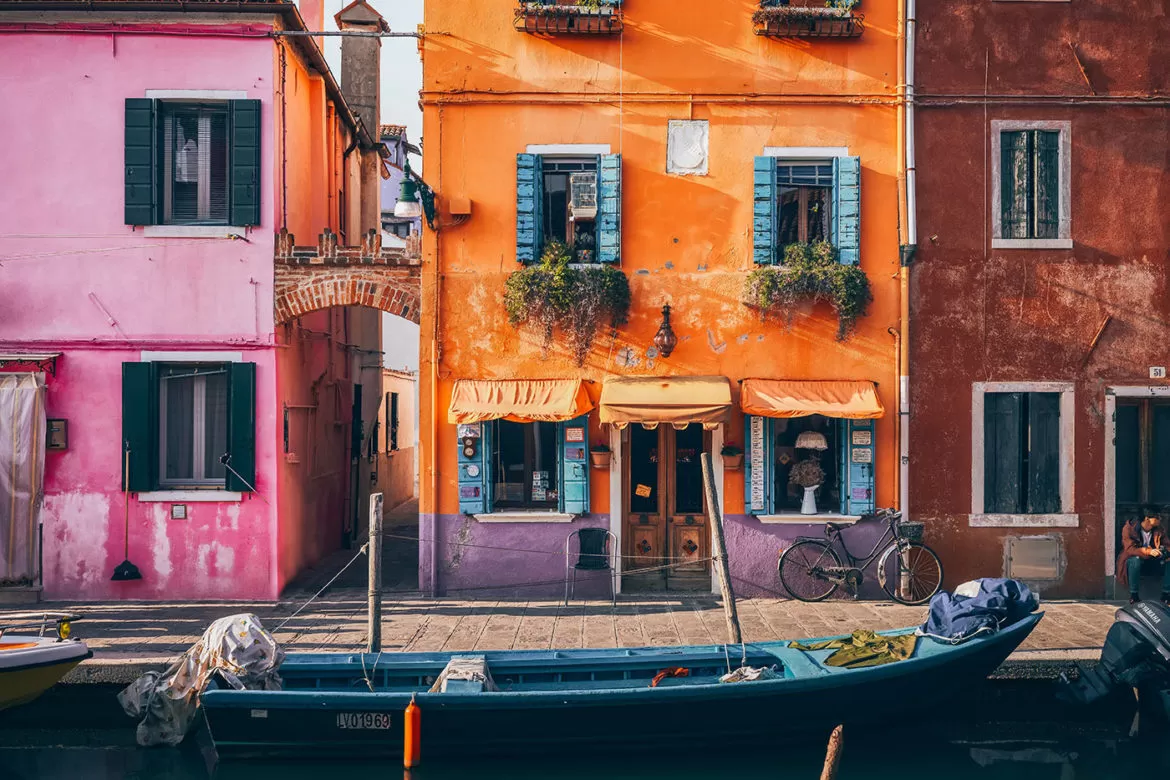
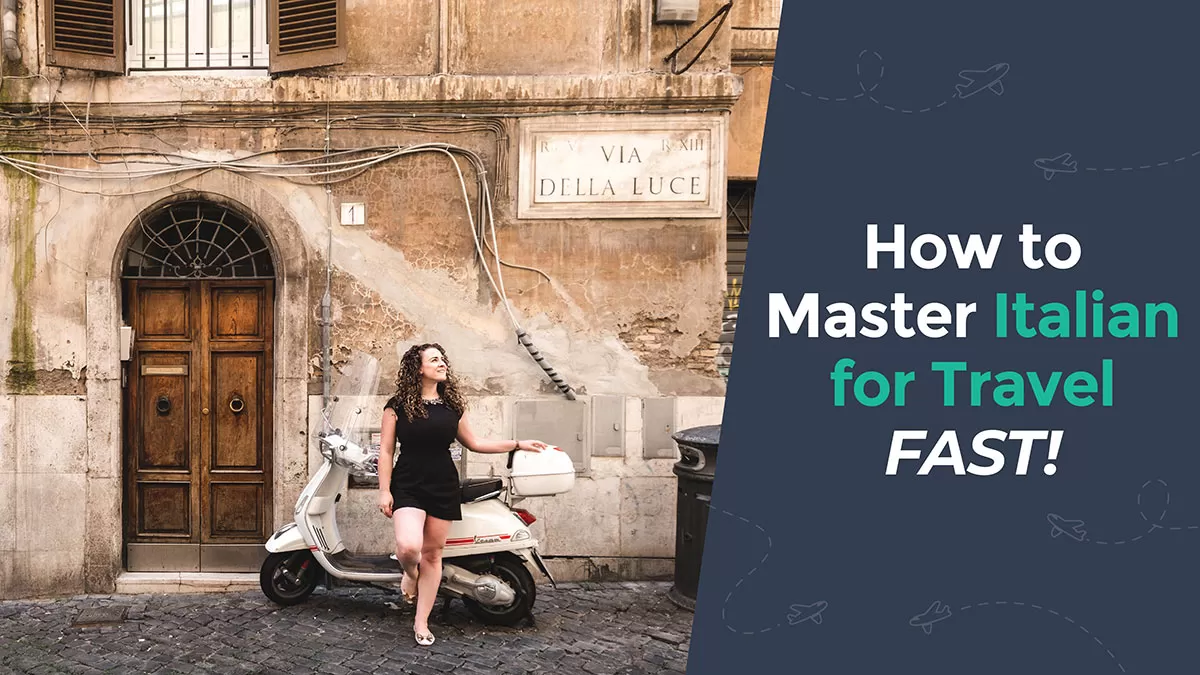
2 comments
I was at a restaurant, and ordered a plate of the Cazzi, instead of the cozze….??♀️?
I wanted to die, be swallowed up by the earth…
Everyone laughed, but me.????
I turned every single shade of red possible?
haha that’s briliant and such an honest mistake. But at least you learned for next time and have a funny story to tell :) Thanks for sharing Lezli